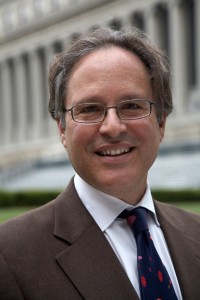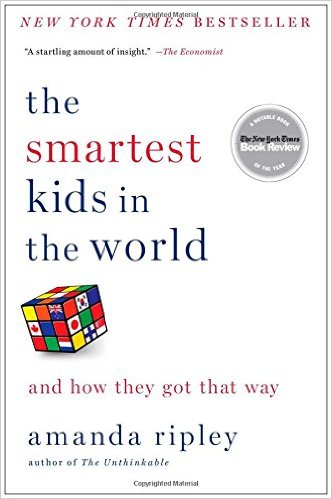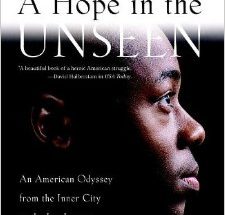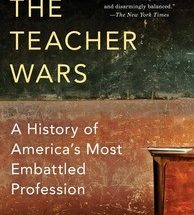
I met Dean Nicholas Lemann, in his 7th floor office at the Columbia Journalism School one morning in March, after, he had announced his decision to step down as dean after ten years, and return after a year’s sabbatical to the faculty. His successor had not yet been announced.
My purpose was not to ask about his work as dean, but his work before he became dean: journalist, editor, and most specifically, author of “The Big Test: The Secret History of the Meritocracy,” published in 2000.
Dean Lemann began by describing his approach. “The way that I do book writing is maybe a little unusual,” he said. “Because I tend to start with a very big theme and realm I’m interested in, and then settle on a story to tell.”
He made clear from the outset that he believes his book has been misread as a book about standardized testing. That was not his purpose. “First I wanted to write a book about the American obsession with success and getting ahead in society,” he said. “And where did that come from? Is that healthy? Is it unhealthy? How are we supposed to think about that? A more academic term for that would be opportunity.”
Lemann said he could have approached the topic from a variety of angles, but he thought the history of the Educational Testing Service (ETS) and the Scholastic Aptitude Test (SAT) might be a good jumping off point. “This (The SAT score) is at least perceived by people as a way that you get told your socioeconomic destiny,” he said.
The Educational Testing Service would lead him to its founder Henry Chauncey, and to James Bryant Conant, the president of Harvard.
He sent a “shot in the dark” letter to the ETS and asked for access to Chauncey’s archives. “They had been thinking about inviting somebody,” he said. “A nonfiction writer to come in and write a book about the history of Chauncey and ETS from the papers.”
Q: This story is about Chauncey and Conant, so the primary sources, the letters and other documents, must have been very important in your reporting. A big moment in the book, for instance, was Conant’s interpretation of a Thomas Jefferson letter, which seemed to establish his motivations. What were some of your key reporting moments?
I went to the ETS archive and I didn’t know anything about ETS or where it came from because the history had never been written down anywhere. It was very inside. A small group in the educational establishment had created it without a lot of public debate or involvement. So I went down there and started reading through all of Chauncey’s papers, which took about two years. It took a long time.
Q: What was that like? Was it mostly boring?
No it wasn’t boring. It turned out oddly that that was how I prepared for doing this job [as Dean of Columbia Journalism School], even though I didn’t know I would be doing this job, because it gives you a window into what an academic administrator does all day and how an institution gets built. It was an odd form of training. But at first I was just trying to get the basics of the story. Who set this thing up? Why did they set it up? What were they thinking about?
Henry Chauncey didn’t really have a big vision of society. But Conant did have a vision, and what I had not realized was how these articles he was writing in the 40’s and things he did as President of Harvard were intimately linked with the creation of ETS and what we think of as meritocracy in the United States. So making those connections was interesting.
Q: Yes you wrote about the scale of his ambitions. So you didn’t start out writing about standardized testing but…
There was a sociologist here at Columbia who died in 2003 but was a big mentor of mine named Robert Merton and he coined this phrase “opportunity structure.” That’s really what this book is about, opportunity structure in the United States.
Q: But did your views of the SAT evolve as a result of writing this book?
Like everybody, I took the SAT. It occupies a lot of mind share for Americans of a certain class. It did for me. I didn’t really know much about it. You sort of accept it as a thing you have to take, but I didn’t know who invented it, or what it was supposed to measure. Most students think it’s really a test of how smart you are. But how colleges used it, all that stuff, I just didn’t know.
First, I had not realized how closely tied the SAT was tied to the original IQ test. There is a direct lineage. Second, I didn’t realize how SATs are validated and what they are supposed to measure, which is to predict grades in college. I don’t know if I started as a total believer in the SAT, but the farther I got into it, the more skeptical I became of the SAT.
Q: Affirmative action in education was also a big theme in your book. Did your understanding or views of it change?
I had been interested in the subject for a long time and had written about it a lot as a journalist. What became clear to me was there was a very profound paradox in this system, which is you create this formal system that is supposed to provide opportunity for all, it surfaces at the same moment as the Civil rights movement, and it turns out that this system, started in a mood of high idealism, doesn’t promote more opportunity for African Americans but less opportunity, so there is a big conflict. Affirmative action is invented as a patch solution to that conflict.
Q: You mentioned that getting access to Chauncey’s archives gave you an insight into what eventually would be your job as an administrator. Did it have an effect on how you saw admissions here at Columbia Journalism School?
When I arrived here we already didn’t require standardized tests in admissions and I was very happy about that and I have resisted entreaties to require a standardized test except TOEFL for non-U.S. students. I feel like I’m in a fortunate position, almost unique among schools in Ivy League Universities, of being able to practice what I preach, because we do authentic assessment in admissions and don’t depend on numbers. So I love the way we do admissions here.
Q: In a way, I see the admissions process here as a form of standardized test. It seems like the school is testing the grit of potential applicants.
There is a lot of confusion around this topic. We’re not super selective, but we’re selective. If you have a selective education institution then you have to have some selection criteria. I think it matters a lot what your criterion is, but you have to have one in the end, some basis.
Ours is a qualitative system. I am very comfortable to agree that grit, in an unquantifiable and unstated way, is a quality that is appropriate to whom you would select to go to a journalism school. I think it is more appropriate than a GRE score.
Q: Conant had a vision for the type of student he wanted to see in Harvard. Do you have a vision for the type of student you’d like to see at your school?
I want to be clear that I don’t get to decide who gets in here. It’s a much more distributed process. I didn’t come here, like Conant, thinking that the school was taking the wrong kind of people and that it needed to start taking the right kind of people.
What I think should be the overwhelming criterion is commitment to journalism. What I look for when I read admissions folders is; is the person showing me that they are genuinely drawn to journalism and have managed to find ways to do journalism or proto-journalism and there is work I can read that shows promise?
I go to the resume and the clips and the essays to some extent. I just look for a picture of a person who is genuinely interested in a passionate way and has made some effort to act on that interest.
Q: Another theme in your book was this idea of Plato’s philosopher-kings, or China’s mandarins, which are sort of the model of the type of public servant Conant envisioned. So it’s interesting that you speak of commitment to journalism as a criterion for admission. I think there are parallels there.
I see what you mean, but I’d like to distance myself from that idea a little bit. What I’m looking for the most is commitment to the function of journalism. Part of the problem with the world discussed in the book, is that they were testing for a finer, better, smarter person, but that person could do whatever they wanted. They didn’t have to demonstrate a mastery of knowledge or say they wanted to do a particular thing. They just had to show that they were promising. What we want to do here, partly because we are a professional school, is test whether you want to be a journalist and whether you will be a good journalist.
Most people who apply here are in a greater or lesser sense idealists who dream of using their work to make a better society. That’s great and many of them do that.
Q: Can you explain this phenomenon of the beneficiaries of the SAT–the students plucked from obscurity–who go to elite colleges to seek lucrative careers instead of taking the road of public service?
You have to understand that the world of people who go to super-selective colleges, which everyone is obsessed with, is epiphenomenal. It’s not statistically important in American society. So one of the big problems with this whole subject is people conflate this whole question of a just society with who gets into Harvard. My fundamental argument that I try to make in the book is it just doesn’t matter.
You can’t fix the whole of society just by coming up with the exact perfect answer to the question of who gets into Harvard. There are just too many people that want to go that can’t go. You can’t make everybody happy.
What do you do if you build this whole structure and all the people use it to go to Wall Street? That’s the essential irony of this system.
If you only take rich preppies, then they aren’t going to be that motivated by money because they already have money, and they are more likely to have this gentlemanly public service thing. If you take people for whom this is a huge sociological leap, then they are naturally more going to be motivated by money.
Everybody who applies to Harvard, Harvard Law School, Harvard Business School knows the routine of saying, ‘I just want to help people, I just want to be a public servant.’ And they may mean it, they may work for Teach for America for a couple of years, but basically what the system has done is create a class of very smart people who go into finance.
Q: I felt like you offered a possible solution to the larger problem of opportunity and inequality in primary and secondary education in America with the idea presented by your character Bill Lee.
I would say that the way to solve all these big social problems is not by obsessively twisting the dials of who gets into Harvard or who gets into Columbia. The way to solve the problems is to focus on the big institutions of society, public schools, how the economy works, etc. That’s how to get to social justice on a large scale.
Have you been keeping up with the fate of the SAT?
One of the things the book called for is a move towards a more achievement-based college admissions process, and less aptitude. One year after the book came out, the single most powerful person in higher education called for the same things I called for. That was Richard Atkinson, President of the University of California.
In response to his challenge, the SAT was re-written as substantially as it’s been since it started in 1926. It still exists, but the directional change in the test itself was completely in the direction I suggested in the book and that was very gratifying to see happen.
The book got misread about being about testing, which it’s not, and my position got misread as being against all testing, which I’m not, so I was very happy about that.



